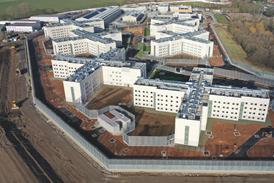Development in the UK, through the planning system, has encouraged legalised corruption for years, argues Ian Abley
When we think of corruption, it is tempting to imagine cash for contract signatures, or favours for favourable planning recommendations. Less than professional professionals could subvert competitive processes and elected representatives might be on the take against the constituency that put them in office.
This is just the kind of corruption that the G8 Group imagines. On 16 July 2006 the G8 industrial countries met in St Petersburg to renew their commitment to fight corruption, particularly among public officials. They endorsed the United Nations Convention Against Corruption, signed in Mérida, Mexico, in December 2003.
But in the UK planning system today, there’s a different sort of collusion at work. There’s richer pickings to be had in working the planning system than through the traditional route of bribes and backhanders. HM Treasury’s Planning Gain Supplement – a Consultation might tell us that “…everyone should be able to live in a decent home at a price they can afford” but no one really wants plenty of developable land released for just anyone to build houses at £800/m2.
To find a traditional scandal we have to look back to the 1960s to “Mr Newcastle”: T Dan Smith. He was elected council leader during the Second World War and charismatically argued for Newcastle upon Tyne to become “…the outstanding provincial city in the country”.
Smith was a pioneer of planning negotiation, squeezing as much benefit as he could for the local community from the developers who wanted to build in the city. Unfortunately, he was also tangled up with the infamous John Poulson, who had sustained his commercial architectural practice by bribing councillors around the country. Smith was a PR consultant to Poulson and in the early 1970s was sentenced to five years in prison. Smith always denied he was a villain, and many (including me) still consider him a “fall guy”.
The potential for corruption exists because development rights were nationalised by the 1947 Town and Country Planning Act. There is money riding on a committee of public officials granting planning approval.
public/private collusion in development has reached a level of maturity in britain
Smith pioneered planning negotiation, and while benefits went to the people, those acting as consultants got their fees too.
Today, public officials find themselves in exactly the same position Smith was in. All of them are close to developers. Section 106 of the 1990 Town and Country Planning Act enabled local planning authorities to enter into legally-binding agreements to restrict development, or get a contribution towards public works. In Milton Keynes this is being levied as a Roof Tax. Soon it will become institutionalised as a Planning Gain Supplement.
Public/private collusion in development has reached a level of maturity in Britain. A small body of farmers are to be denied the freedom to sell land for anyone to build on, so that it remains possible to speculate on planning approval, and extract planning gain in the name of the “community”.
Ed Balls, economic secretary to the Treasury, is married to Yvette Cooper, minister for housing and planning at the Department for Communities and Local Government. They are trusted, along with their public officials and friends in the development sector, to negotiate completely legal systems of land supply restriction and planning approval supplements. They can talk about affordability as long as they don’t collapse the planning approval market. Just in case they forget this, non-governmental organisations like the Campaign to Protect Rural England will be vigilant.
The anti-corruption G8 recognised the “… critical contribution of non-government organisations in the fight against corruption”. But they were thinking about a bit of whistle-blowing on Smith-like “consultancy”. Not protection of legal planning negotiations which are considerably more lucrative than the dirty business of construction.
Source
Construction Manager




















No comments yet